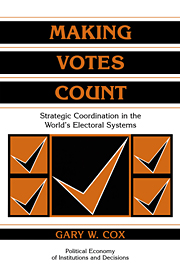
-
Select format
-
- Publisher:
- Cambridge University Press
- Publication date:
- 05 August 2012
- 28 March 1997
- ISBN:
- 9781139174954
- 9780521585163
- 9780521585279
- Dimensions:
- (228 x 152 mm)
- Weight & Pages:
- 0.621kg, 360 Pages
- Dimensions:
- (228 x 152 mm)
- Weight & Pages:
- 0.54kg, 360 Pages
You may already have access via personal or institutional login
Book description
Popular elections are at the heart of representative democracy. Thus, understanding the laws and practices that govern such elections is essential to understanding modern democracy. In this book, Cox views electoral laws as posing a variety of coordination problems that political forces must solve. Coordination problems - and with them the necessity of negotiating withdrawals, strategic voting, and other species of strategic coordination - arise in all electoral systems. This book employs a unified game-theoretic model to study strategic coordination worldwide and that relies primarily on constituency-level rather than national aggregate data in testing theoretical propositions about the effects of electoral laws. This book also considers not just what happens when political forces succeed in solving the coordination problems inherent in the electoral system they face but also what happens when they fail.
Awards
Winner of the Wilson Prize for the best book in politcal science published in 1997The Luebbart Prize awarded to the best book in comparative politicsThe prize from the American Political Science association for the best book in political economy
Reviews
"Every serious scholar of political systems should read this book....Cox is a master when it comes to explaining ideas generated by a logic-based theory....this book is a very important contribution to our knowledge about electoral systems. It will be the major book in this area for some time to come." Melvin Hinch, American Political Science Review
"...this is a great book, a must for all those interested in the study of elections. Cox powerfully demonstrates the fruitfulness of looking at the impact of electoral systems from the perspective of formal theory, provided this is combined with solid empirical analysis." André Blais, Canadian Journal of Political Science
"This book is a unique contribution to the fields of comparative politics and formal political theory. It offers a model integrating many diverse aspects of electoral competition that together bring into existence systems of national poltical parties. Gary Cox combines social choice theory, public choice theory, spatial theory, and the institutional approach to electoral studies to reach a new level of understanding of political competition in democracies. Gary Cox's new book is not only a theoretical study, but also a useful reference on comparative electoral institutions. ...the suthor also draws attention to such often overlooked institutions as rules of candidate nomination and party registration." Olga Shvetsova, Political Science Quarterly
Contents
Metrics
Altmetric attention score
Full text views
Full text views help Loading metrics...
Loading metrics...
* Views captured on Cambridge Core between #date#. This data will be updated every 24 hours.
Usage data cannot currently be displayed.
Accessibility standard: Unknown
Why this information is here
This section outlines the accessibility features of this content - including support for screen readers, full keyboard navigation and high-contrast display options. This may not be relevant for you.
Accessibility Information
Accessibility compliance for the PDF of this book is currently unknown and may be updated in the future.


